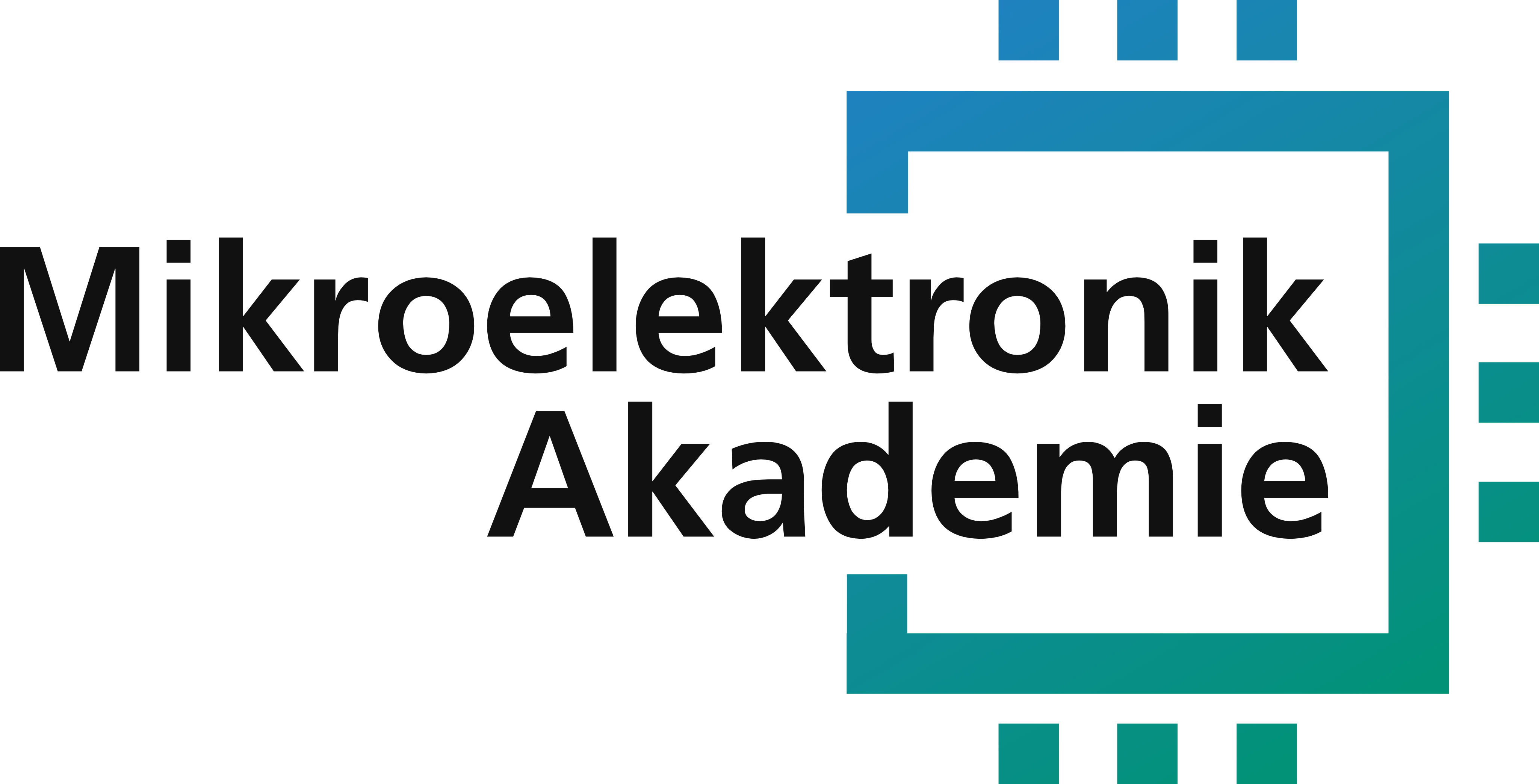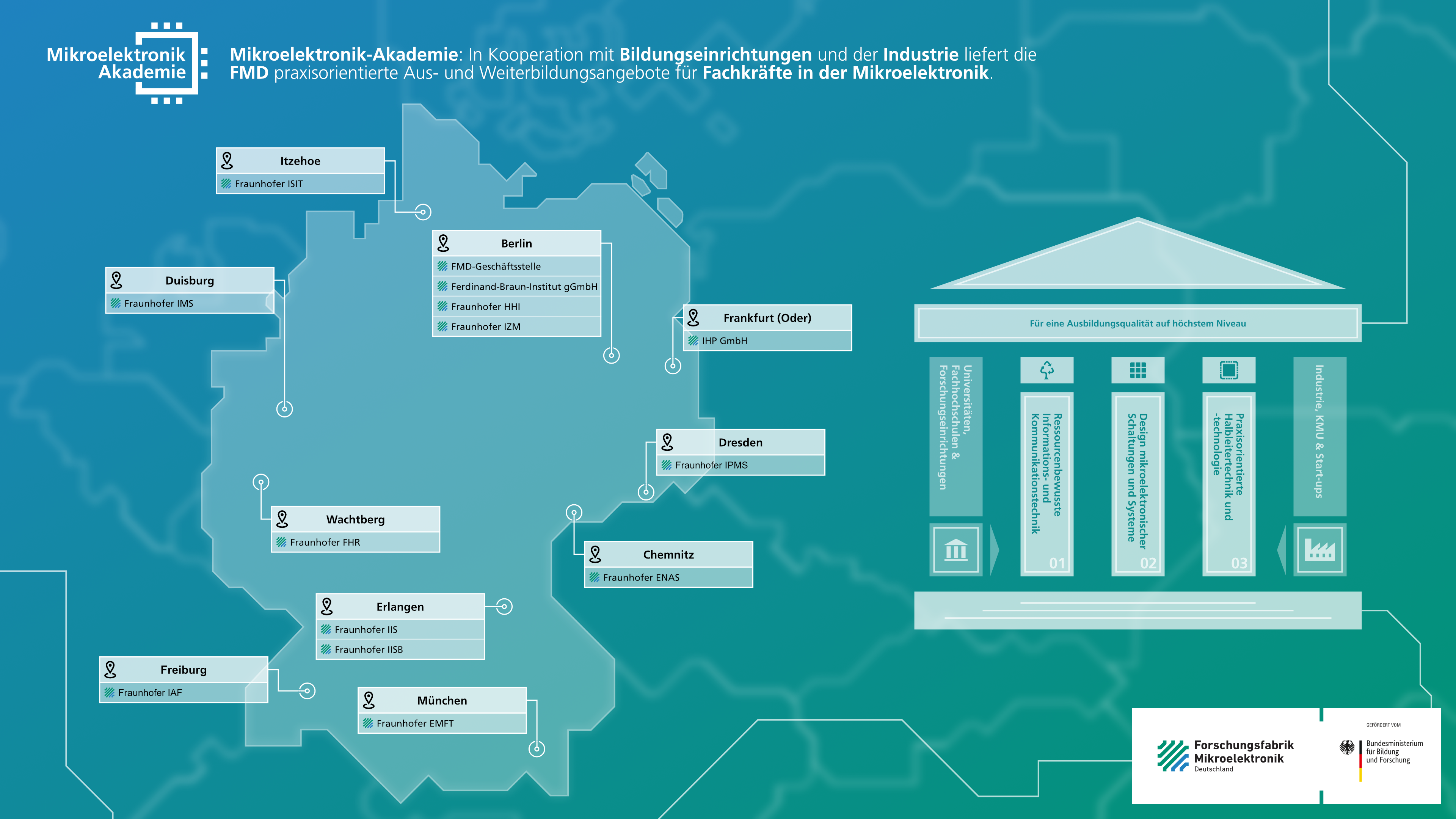Towards top-level training quality: The FMD starts setting up a Microelectronics Academy
By establishing the Microelectronics Academy, the Research Fab Microelectronics Germany (FMD for its acronym in German) is laying the foundation for modern training programs in the field of micro and nanoelectronics aimed at counteracting the shortage of skilled workers in Germany. In cooperation with educational institutions and industry partners, the academy intends to work out a set of practice-based modules during a one-year design phase and subsequently test them over the next three years. Funding for this project is provided by the Federal Ministry of Education and Research as part of the Federal Government's Framework Programme for Microelectronics.


The Research Fab Microelectronics Germany (FMD) is setting up a Microelectronics Academy throughout Germany, which is being implemented as part of two projects funded by the Federal Ministry of Education and Research (BMBF) - the cross-location competence center for resource-conscious information and communication technology (Green ICT @ FMD) and the FMD module Quantum and Neuromorphic Computing (FMD-QNC). The Microelectronics Academy aims to develop and test new contents and formats for training specialists in the fields of micro and nanoelectronics. Whether as extension to university education or as further qualification for employees: The underlying concept of the Academy entails training and development for professionals in the field of microelectronics as well as for the upcoming generation of experts. To enable modern and, especially, hands-on learning and training opportunities, the Microelectronics Academy strives for a close cooperation with educational institutions, along with ongoing projects for the promotion of young talent as well as with industry.
Prof. Gerhard Kahmen, Scientific and Technical Director of IHP GmbH – Leibniz Institute for High Performance Microelectronics, one of the 13 FMD institutes, has been appointed as the director of the Microelectronics Academy. During the first of the 3-year phase, a set of modules will be designed in line with the needs of the specialists in the field, which will subsequently undergo a real-life testing process involving a selection of pilot modules. The Microelectronics Academy represents a first step in addressing the shortage of specialists in this field and acts as a catalyst for follow-up activities regarding the education in microelectronics. Serving as a national and overarching Academy, it is foreseen to offer educational programs at both federal state and national levels.
Content focus on microelectronics topics of today and tomorrow
In three thematic pillars, the high degree of specialization required in the field of microelectronics should be enabled at an excellent scientific level, while the skilled workforce demand should be optimally met. In terms of the thematic scope, the Academy is structured as follows: The first two pillars, Resource-conscious ICT and Practice-oriented semiconductor engineering and technology (both derived from the Green ICT @ FMD and FMD-QNC projects), are rounded off by a third pillar, design of microelectronic circuits and systems. Over the long term, the aim is to actively shape and drive forward areas such as climate protection, sustainability, novel computing technologies, as well as trustworthiness in semiconductors and chips.
In this regard, Mario Brandenburg, Parliamentary State Secretary to the Federal Minister of Education and Research, remarks: “The innovative strength in chip development depends entirely on the skilled experts, young talents and their ideas. They are a crucial factor for Germany as a technology hub; hence, their promotion is a priority for the Federal Ministry of Education and Research. Consequently, we are enhancing the existing range of training and continuing education programs by setting up the Microelectronics Academy. After all, the shortage of skilled workers in this future-oriented industry is already tangible and will be further exacerbated by the EU Chips Act and new semiconductor factories in Europe. In this context, the Microelectronics Academy constitutes a concrete contribution to reaching the goals of the German government's new skilled labour strategy.”
Meanwhile, Professor Gerhard Kahmen, Director of the Microelectronics Academy, explains: “The added value of electronic systems lies to a large extent in the design of systems and chips, as well as in the operation of the infrastructures and clean rooms required for their production, both of which require a considerable number of skilled professionals. The Microelectronics Academy pursues the goal of tackling the shortage of skilled workers in the field of microelectronics on a national level by means of close integration and cooperation with industry, universities and training institutions as well as politics. ”In this context, he also reiterates the strategic and geopolitical relevance of core competencies of the microelectronics value chain: “Microelectronic systems are the backbone of a modern economy and increasingly permeate all social domains. The availability of cutting-edge and, in particular, trusted microelectronics is therefore the prerequisite and the basis for a technological sovereignty of Germany and Europe that enables us to live our liberal values and represent them around the world.”
For the implementation of the Microelectronics Academy, the FMD can draw on the extensive and long-standing experience of its cooperating institutes and the knowledge gained from ongoing projects. Thus, it is possible to optimally pave the way for an excellent transfer of theoretical and practical knowledge to counteract the challenges posed by the increasing shortage of skilled workers.
Bundling synergies and driving networking forward
The FMD is assuming not only the organizational management but also the responsibility for the three thematic pillars within the process of setting up the Microelectronics Academy.
The overarching goal is to improve the quality of the training of skilled workers in the field of microelectronics. Therefore, alongside close collaboration with industry and research partners, cooperation with educational institutions and established training and continuing education initiatives will be pursued. In this way, numerous synergies will arise, as well as the opportunity for a comprehensive transfer of theory and practice. At the same time, the cooperation of the stakeholders involved in the academy should be broadened throughout Germany and, in the long term, to Europe, leading to a close-meshed network of knowledge transfer.
By providing certification and qualification courses, the Microelectronics Academy intends to enable accessibility to the subject of microelectronics for interested parties with varying degrees of prior education. Furthermore, the promotion of young talents through an extensive and practical learning and training program will also constitute a central focus of the academy. Finally, the academy will provide access to hands-on design environments as well as state-of-the-art manufacturing infrastructures and test beds.

About the Research Fab Microelectronics Germany (FMD)
For the first time, eleven institutes of the Fraunhofer Group for Microelectronics and the two Leibniz institutes FBH and IHP have been combining their expertise within the framework of the FMD since 2017 in order to achieve and expand a new quality level in the research, development and (pilot) production of semiconductor-based micro- and nanosystems. With more than 2,000 scientists, the FMD is one of the largest and world-leading R&D associations for micro and nanoelectronics applications and systems in Europe. As a global driver of innovation, the FMD provides a unique range of expertise and infrastructures, while contributing to Germany and Europe's leading position in research and development. This implies bridging the gap between basic research and cross-technology solutions, right through to customer-specific product development. The German Federal Ministry of Education and Research provided funding for the modernization of the research infrastructure of the thirteen participating institutes from 2017 to 2021.
Press Kit
Last modified:
 Fraunhofer Group for Microelectronics in cooperation with the Leibniz institutes IHP and FBH
Fraunhofer Group for Microelectronics in cooperation with the Leibniz institutes IHP and FBH